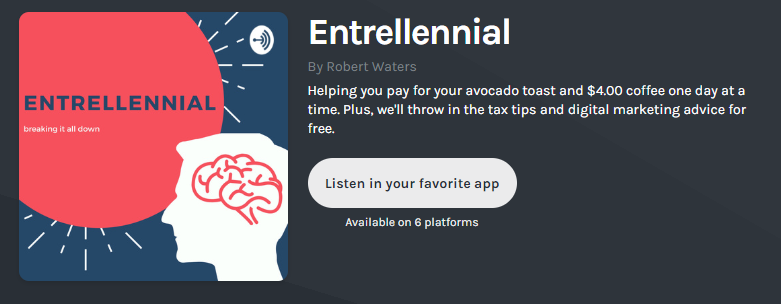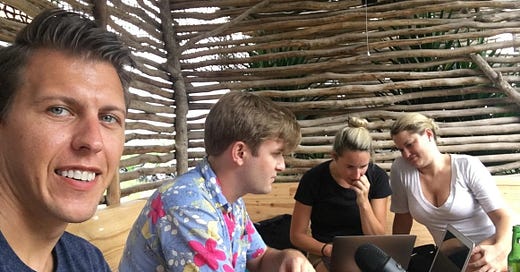February 16th, 2019: Greetings from Bail 🌴
The Boundless Newsletter explores the relationship between work & life, unlocking our creative potential and thoughts on the so-called "future of work" Visit Site
🙏🏻 Shoutout to Rachel for becoming the newest Patron of boundless
💭📚💡 “Re-imagine Work” Kicking Off March 24th - Join the experiment
In NYC? Looking for something that will bring a little more joy and connection? Check out America Needs You and apply to be a mentor coach. You’ll spend two years matched with a first-gen college student and also be part of an amazing community.
Writing is my focus for 2019. If you want to support this journey, consider becoming a patron on Patreon or becoming a subscriber:
#1 Starting A Podcast In 70 Minutes
It is easy to be overwhelmed by starting anything in today’s world. Yet in the past few years a lot of the technology and tools available to create have become much much simpler and easier to use.
The idea that starting or creating something new is hard is a cliche reinforced by many of the click-bait driven-articles that have headlines like “Here are the 37 steps you need to start a top ranking podcast.” This tricks us into thinking we need to create an NPR or Gimlet level podcast.
When I started my podcast, I had no idea what I was doing, but I knew I just needed to get started. Right after I “launched” with a 7 minute episode detailing why I started the podcast, I lost my voice for three weeks and had to cancel all the interviews I had scheduled. My first few interviews were not as good as they could have been because I spent a lot of time in my own head worried “what will people think?”
All of these things will happen no matter how much you prepare.
This past week in Bali, I put out a challenge to someone willing to start a podcast in under an hour. Someone took my challenge and I helped him, his wife and sister in the creation process. I told them “I’m serious, we launch at the end of the hour”
Here’s the team in action

By the end of the hour, we had recorded an intro, created some cover are and published the podcast on the free hosting platform Anchor.

I hope that they are motivation for you all who have dormant creative projects and know you need to just get started. If you want a nudge, hit reply and lets chat.
If you want to start your own podcast, you can check out my updated guide on starting a podcast.
#2 Starting & Investing In Calm Companies

I talked with Tyler Tringas, who is a former startup founder, digital nomad and vagabond. He’s recently started a firm called Earnest Capital focused on helping bootstrappers fund their companies so that they can avoid going into $50,000 of credit card debt like he did.
Hear about how he is trying to help people build “calm companies” and his own journey of entrepreneurship on the pod.
🎧 Listen Now: Itunes • Stitcher • Google Play • Overcast • Spotify
#3 HBR’s titles may be on point, but their content misses the mark
I keep reading articles from HBR and other mainstream publications that seem to be signal-boosting the calls for more rest, breaks and leisure, but seem to make the mistake of assuming that all of this rest is merely for the purpose of working more efficiently.
I believe this desire to optimize more of life may in fact be leading to more burnout.
Here is the HBR’s piece on our “time famine” in which the piece starts off with some pretty interesting research on why we tend to value money over time. Then the article then slowly falls apart, starting with the author’s shocking (and brave) admission of her addiction to work:
I’m a happiness researcher. I should know better than to sacrifice all my leisure hours to work and making money. Yet I feel as if I must be on call constantly to keep up with the demands of work. To cope, I email or talk on the phone while commuting to the office, while exercising, while on beaches, and even while on a safari. From time to time, I have been spotted typing on my laptop in a gym locker room. And I confess I spent one and a half hours working (not so secretly) during my wedding reception.
Perhaps because the author has not experienced a decrease in her commitment to work the recommendations were completely disconnected from the fundamental problem she outlined. She recommended, “more vacation time,” “outsourcing your chores” and asking for extensions on deadlines at work. Or even better, she shares this advice from an HR exec in silicon valley to try to persuade employees that they should just be happier:
“To better motivate people to apply for jobs that tend to have lower pay and more vacation time, we should show the total compensation package, not just the salary, putting a value on health care, child care, public transportation subsidies, vacation, and sick leave, and calculating it for all. That way, employees will know what they are truly paid.”
Then, the most jaw dropping advice is for employers to “reward employees with time, not money.” Great you say…give people time back.
But no, she just means more outsourcing of chores so that people can work more:
Thirty-seven percent of those organizations allowed employees to redeem rewards points for time-saving services like housecleaning…Researchers at Stanford University conducted a pilot study in which doctors were rewarded with vouchers only for time-saving services. Those who received them reported higher work-life balance and lower intentions to quit than other doctors did.
HBR then followed this up with another recent piece titled “Why You Should Work Less and Spend More Time on Hobbies”
Also sounds great, right?
I understand they are trying to get clicks with their title, but the article does not actually ever make the argument that you should work less. This is because the whole point of rest is to work more:
“But by spending time on music, I boost some of my most important workplace skills.”
Isn’t the whole point of such leisure activities (the active sort of leisure) for the sake of the activities itself.
“When I take a break from work to go make music, I reconnect with that perspective. I keep thinking about how someone hearing my song for the first time might respond. I do all I can to see (or hear) the world through someone else’s eyes (or ears). Then, when I resume the work project, I take that mentality with me.”
HBR seems absolutely stuck with the idea that we should work long hours, but focus our energy on merely avoiding burnout or outsourcing our tasks to other people. Perhaps this makes sense because their audience targets the kind of successful people where work is the center of their lives that have the resources to optimize their life rather than stop working.
Yet I wonder based on the fact that they are using the titles “time for happiness” and “why you should work less” that they may already know what people really want.
I think HBR can do better.
#4 Reads & Listens
Reads
👉 Boundless Reads #105 - My Weekly Newsletter Of Five Good Things To Read
Past Reads: My full essay assessing Keynes 2030 predictions of “post-work
Podcasts
This podcast on tribal psychology made me realize how easy it is to take an average person and radicalize them
This podcast with Jaron Lanier made me want to quit social media (and this crazy long article gave me endless tips to limit my use)
#5 Quotes
Maria Popova defines success:
Once again, I am going to side with Thoreau. He said something like: ‘If the day and night are such that you greet them with joy, and life emits a fragrance like flowers, it’s more elastic and more starry and more immortal, that is your success.’
For me, that’s pretty much it: waking up and being excited and curiously restless to face the day ahead, and being very present with that day, and then going to bed feeling like it actually happened, that the day was lived.
There’s nothing more than that, really.
Was Thoreau the original FIRE blogger?
As I preferred some things to others, and especially valued my freedom, as I could fare hard and yet succeed well, I did not wish to spend my time in earning rich carpets or other fine furniture, or delicate cookery, or a house in the Grecian or the Gothic style just yet.
If there are any to whom it is no interruption to acquire these things, and who know how to use them when acquired, I relinquish to them the pursuit. Some are “industrious,” and appear to love labor for its own sake, or perhaps because it keeps them out of worse mischief; to such I have at present nothing to say.
Those who would not know what to do with more leisure than they now enjoy, I might advise to work twice as hard as they do,—work till they pay for themselves, and get their free papers. For myself I found that the occupation of a day-laborer was the most independent of any, especially as it required only thirty or forty days in a year to support one.
The laborer’s day ends with the going down of the sun, and he is then free to devote himself to his chosen pursuit, independent of his labor; but his employer, who speculates from month to month, has no respite from one end of the year to the other.

🔥 Take The Three-Week Self-Employment Challenge over at BoundlessU
☕ Interested in Working with Paul?
🔨 Download the fear setting exercise, freelance target income calculator or career transition playbook for free or a gift
🏫 Want to learn the secrets of strategy consultants? Take my Think Like A Strategy Consultant Course. Enroll now for $199.
🎁 Want to become a supporter of this humble newsletter? Support on Patreon or click below.




